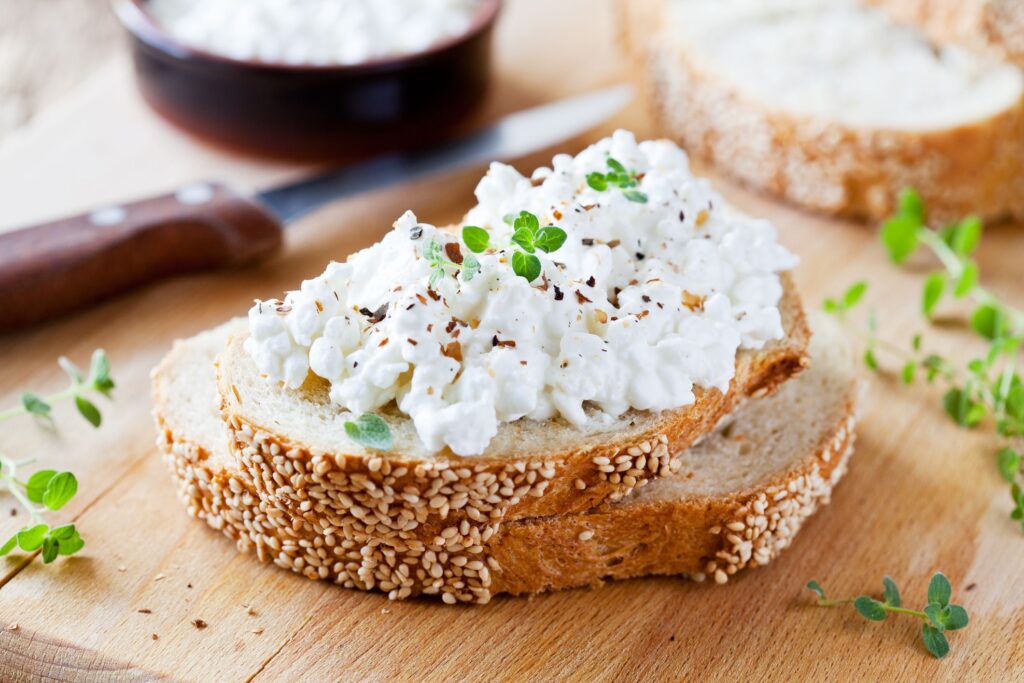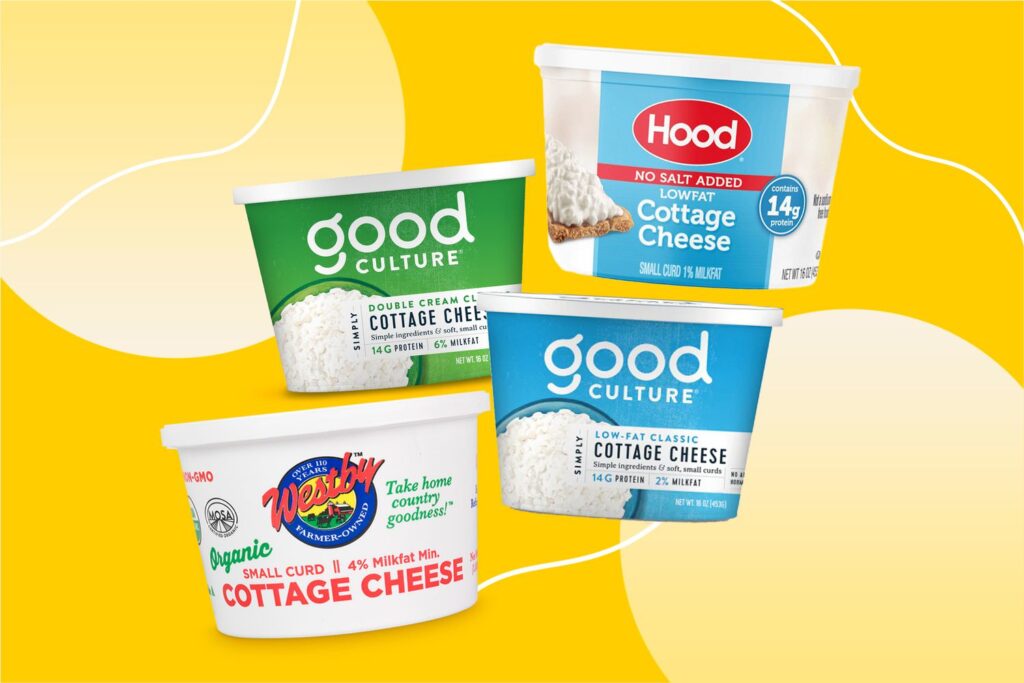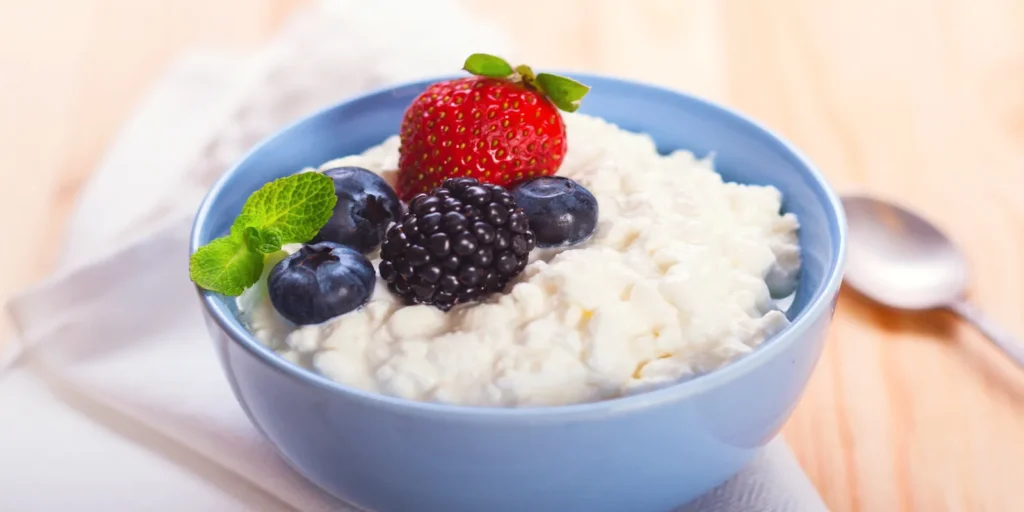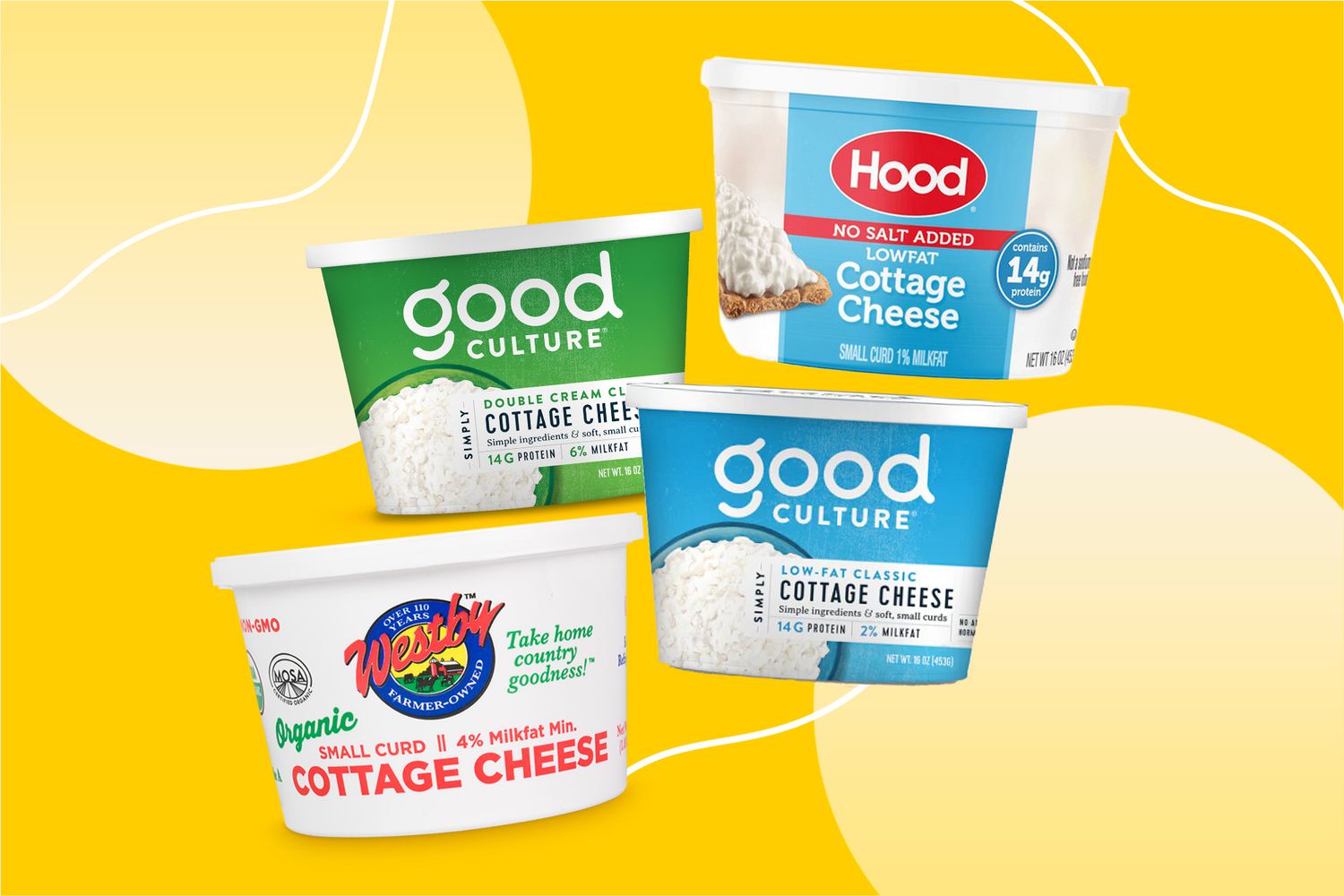Cottage cheese nutrition is enjoying a well-deserved comeback. This simple, fresh dairy product packs a surprising nutritional punch—it’s not only versatile, but also rich in protein, low in calories, and loaded with essential vitamins and minerals. At Tastetrove, we believe in spotlighting ingredients that are both tasty and good for you. In this article, you’ll discover everything you need to know about cottage cheese: its calorie and macro profile, the health benefits, how to choose the right variety, and ways to use it in your meals for maximum benefit.
What is Cottage Cheese?
Cottage cheese is a fresh, soft cheese made from the curds of cow’s milk. Unlike aged cheeses, it isn’t ripened or aged; the curds are simply drained and sometimes “dressed” with a little cream. Different versions are available: non-fat, low-fat (1–2 %), and full-fat, with varying curd sizes—small, medium, or large. Because of its mild flavor and mild texture, cottage cheese pairs well with both savory and sweet dishes. (Healthline)
Nutrition Facts: Calories, Protein & Macros
The nutritional content of cottage cheese depends largely on its fat percentage and whether any extra ingredients (salt, cream, flavorings) have been added. For clarity, here are figures for plain cottage cheese (low-fat / ~2 %) and what to expect in other versions.
| Serving Size | Calories | Protein | Carbohydrates | Fat | Key Micronutrients |
|---|---|---|---|---|---|
| ~100 g (low-fat, ~2 %) | ~ 84 kcal (Cleveland Clinic) | ~ 11 g protein (Cleveland Clinic) | ~ 4-5 g total carbs (including ~ 4 g naturally-occurring sugar) (Cleveland Clinic) | ~ 2.3 g fat (Cleveland Clinic) | calcium, phosphorus, selenium, riboflavin, vitamin B12 (Healthline) |
| Half-cup (~113 g), 1 % milk fat | ~ 81 kcal (Healthline) | ~ 14 g protein (Healthline) | ~ 3 g carbs (Healthline) | ~ 1 g fat (Healthline) | see above |
Other versions, such as full-fat cottage cheese, can have more fat and slightly more calories; non-fat versions will have less fat but sometimes may include thickeners or additives. Also, sodium levels vary significantly between brands. (Cleveland Clinic)
Cheese Nutrition is an important topic for anyone who enjoys dairy and wants to make healthier food choices. One of the biggest benefits of Cheese Nutrition is its rich supply of protein and calcium, which support strong bones and muscle repair. Another key factor in Cheese Nutrition is the variety of vitamins like vitamin B12 and riboflavin, which play essential roles in energy and red blood cell production. While Cheese Nutrition offers many health advantages, it’s also important to be mindful of sodium and saturated fat levels. By understanding Cheese Nutrition, you can choose options that fit your dietary goals and enjoy cheese as part of a balanced lifestyle.

Health Benefits of Cottage Cheese
Cottage cheese isn’t just about macros. Here are the wide-ranging health benefits it offers.
1. High Protein for Muscle, Satiety & Weight Management
- Cottage cheese is rich in high-quality protein, especially casein. Casein digests more slowly than whey, which means it provides a longer, sustained release of amino acids. This helps with muscle repair and regeneration, especially if consumed after workouts or before sleep. (Healthline)
- Because of its protein density, it promotes fullness or satiety, which can reduce overall calorie intake — helpful for weight loss or maintenance. (Healthline)
2. Bone Health & Mineral Support
- Cottage cheese is a good source of calcium, phosphorus, and often vitamin B12. These nutrients are essential for maintaining strong bones, supporting bone mineral density, and lowering risk of osteoporosis. (Cleveland Clinic)
- Additionally, protein itself plays a role: adequate protein intake helps in bone maintenance and may reduce risk of fractures as one ages. (Cleveland Clinic)
3. Blood Sugar Control
- With relatively low carbohydrates and no added sugars in plain cottage cheese, it’s a smart component of meals for stabilizing blood sugar. (UCLA Health)
- The slow-digestion of casein helps prevent blood sugar spikes after eating. (Cleveland Clinic)
4. Gut Health & Probiotics
- Some cottage cheese varieties contain live and active cultures, which function like probiotics and can help balance gut microbiota. This contributes to digestive health. (UCLA Health)
- Even in those without added cultures, dairy proteins and minerals in cottage cheese support gut health. (UCLA Health)
5. Antioxidants & Trace Minerals
- Cottage cheese provides selenium, which plays a role as an antioxidant, helping to protect cells from oxidative stress. (Healthline)
- Other B vitamins (riboflavin, B12) are present, supporting energy production, red blood cell formation, and neurological health. (Healthline)
6. Weight Loss & Healthy Body Composition
- Because cottage cheese is low in calories (depending on fat content), high in protein, and filling, it’s often recommended in weight-loss diets. A diet higher in protein helps preserve muscle while losing fat. (Healthline)
- It may also help reduce fat accumulation and enhance fat loss when combined with calorie restriction. (Healthline)
Things to Watch Out For
While cottage cheese is very nutritious, there are a few caveats to be aware of, especially for certain populations.
- Sodium: Some cottage cheese products are high in sodium, which can be problematic for people with hypertension or those limiting salt. Try low-sodium or “no salt added” versions. (Cleveland Clinic)
- Fat content / Saturated fat: Full-fat cottage cheese will have more fat and calories, including more saturated fat. Depending on your dietary goals, you may prefer low-fat or non-fat versions. (Cleveland Clinic)
- Lactose / Dairy allergy: Being a fresh dairy product, cottage cheese contains lactose and dairy proteins (casein, whey). Individuals with lactose intolerance or milk allergy should proceed with caution. (Healthline)
- Added sugars or flavorings: Some flavored cottage cheeses or mixes include added sugars. These increase carbohydrate load and calories, reducing the benefits. Always check the ingredient list. (UCLA Health)
How to Choose the Right Cottage Cheese
To get maximum benefit (and taste), here are tips for selecting the best cottage cheese:
- Pick plain versions without added sugar or fruit if you’re watching sugar or carbs.
- Check the fat %: Non-fat, 1 %, 2 %, full-fat — choose based on your dietary needs. For weight loss, low or non-fat is often better; for satiety, a bit of fat can help.
- Check for live and active cultures if gut health / probiotics are important to you.
- Compare sodium levels — many brands vary widely.
- Decide on curd size: small vs large curd, as it affects texture and mouthfeel.
Delicious Ways to Use Cottage Cheese
Cottage cheese is versatile. Here are ideas to include it in your diet — helping you enjoy it, not just tolerate it!
- Mix it with fresh fruit (berries, peach, melon) and a sprinkle of nuts for a satisfying breakfast or snack.
- Use it instead of sour cream or mayo in dips, dressings, or as a topping.
- Blend into smoothies for a creamy texture + protein boost.
- Stir into oatmeal or warm grains.
- Swap it in for ricotta or cream cheese in baked dishes / lasagna.
- Use as a bedtime snack — high-protein, low fat helps keep you full overnight.
- For savory meals: add cottage cheese into salads, on toast, or blend with herbs and spices as a spread.
Cottage Cheese vs Other Dairy (e.g. Yogurt, Hard Cheeses)
Comparisons can help understand where cottage cheese fits in your diet:
- Vs Greek yogurt: In many cases, cottage cheese has similar or higher protein content. Also, some people prefer its texture or flavor. However, yogurt often has probiotics by default; cottage cheese sometimes doesn’t unless specified.https://tastetrove.net/
- Vs hard cheeses: Cottage cheese is much lower in fat, particularly saturated fat, and lower in calories. Hard cheeses are aged, have concentrated fat, and often more sodium. (Cleveland Clinic)
DIY & Storage Tips
- You can make simple cottage cheese at home by curdling milk with a mild acid (vinegar or lemon) and draining whey. This gives you control over salt, fat, and additives. (Healthline)
- Store cottage cheese in its original sealed packaging; once opened, consume within a few days and refrigerate properly.
- If it smells sour (beyond normal dairy smell) or has mold, discard.
Summary
Cottage cheese is more than just a “diet food.” It offers real nutritional value with high-quality protein, important minerals (like calcium, phosphorus, selenium), relatively low calories (depending on fat content), and potential benefits for weight management, bone health, and metabolic control. Choosing the right variety (low-sodium, plain, appropriate fat content) maximizes the benefits, and using cottage cheese creatively in meals ensures you’ll enjoy it.
Further Reading & References
Here are some useful external sources that dig deeper into the science:
- Healthline: Cottage Cheese — Benefits and Nutrition (Healthline)
- Cleveland Clinic: 7 Reasons Why Cottage Cheese Is Good for You (Cleveland Clinic)
- UCLA Health: 5 Cottage Cheese Benefits — and How to Add More to Your Diet (UCLA Health)
Internal Links Suggestions (Tastetrove)
To keep readers engaged on your own site, you could link to your own related content, such as:
- “High-Protein Foods You Should Be Eating” — to show cottage cheese in the context of other protein sources.
- “Healthy Dairy Alternatives & Recipes” — a post that compares dairy and non-dairy options.
- “Easy Low-Sugar Snacks” — where cottage cheese can be featured as a recipe or idea.
If you like, I can format this for Tastetrove (with images, subheadings, or SEO meta description), or write a shorter version (for social media). Do you want me to prepare that?
Perfect — here are some FAQs and product ideas you can add to your Tastetrove article on cottage cheese.
Cheese Nutrition provides a powerful combination of protein, calcium, and healthy fats that support overall wellness. One of the highlights of Cheese Nutrition is its role in strengthening bones and teeth through essential minerals. Many people turn to Cheese Nutrition for its rich supply of vitamins like B12 and riboflavin, which aid energy and metabolism. Athletes value Cheese Nutrition because it delivers high-quality protein for muscle growth and recovery. While Cheese Nutrition offers many benefits, it’s important to balance intake due to sodium and saturated fat. By understanding Cheese Nutrition, you can make smarter choices and enjoy cheese as part of a healthy diet.
FAQs About Cottage Cheese Nutrition
1. How many calories are in a cup of cottage cheese?
A one-cup serving (~210 g) of low-fat (2 %) cottage cheese contains about 200 calories, depending on the brand and whether cream or salt is added.
2. Is cottage cheese good for weight loss?
Yes. Its high protein and low calorie density help keep you full, making it a smart choice for weight loss diets.
3. Does cottage cheese have probiotics?
Not always. Some brands add live and active cultures, but many don’t. Always check the label if you want probiotic benefits.
4. Can lactose-intolerant people eat cottage cheese?
Cottage cheese does contain lactose. However, some people with mild lactose intolerance tolerate it in small portions, especially the low-lactose versions.
5. Is cottage cheese healthier than Greek yogurt?
Both are healthy. Cottage cheese typically has slightly more protein per serving and fewer carbs, while Greek yogurt often contains probiotics and is creamier.
6. How much protein is in cottage cheese?
On average, a half-cup serving provides 12–14 g of protein, making it one of the highest-protein dairy foods available.
7. What type of cottage cheese is best for building muscle?
Low-fat or 1 % cottage cheese is ideal—it’s high in protein with fewer calories, supporting muscle recovery while keeping fat intake lower.
8. Can you eat cottage cheese every day?
Yes, in moderation. It’s safe and nutritious daily, but choose low-sodium varieties if you eat it often.
Cheese Nutrition is valued for its balance of protein, fat, and essential minerals that make it a nutrient-dense food. Many health experts highlight Cheese Nutrition for its calcium content, which is crucial for bone density and dental health. Another advantage of Cheese Nutrition is the presence of vitamin A, vitamin B12, and zinc, all of which support immunity and energy production. Athletes often turn to Cheese Nutrition as a convenient source of protein to aid in muscle repair and recovery. While Cheese Nutrition provides many benefits, moderation is key due to its sodium and fat content. Choosing wisely allows you to enjoy Cheese Nutrition as part of a balanced diet.
Cheese Nutrition offers a rich profile of protein, calcium, and healthy fats that make it both satisfying and nourishing. One of the main benefits of Cheese Nutrition is its ability to support bone health and muscle strength through essential minerals. Many people appreciate Cheese Nutrition for its versatility, since different types of cheese provide varying levels of protein and calories. A key point in understanding Cheese Nutrition is recognizing how portion size impacts overall dietary balance. While Cheese Nutrition brings valuable vitamins and minerals, it’s important to watch sodium and saturated fat intake. With mindful choices, Cheese Nutrition can be a delicious and beneficial part of everyday meals.

Related Products to Feature on Tastetrove
You can recommend or review products alongside your article for SEO + affiliate potential:
- Organic Low-Fat Cottage Cheese – A cleaner option for those wanting minimal additives.Organic Low-Fat Cottage Cheese is a wholesome choice for anyone looking to enjoy the creamy texture and protein-rich benefits of cottage cheese while keeping calories and fat intake in check. Made from milk sourced from organically raised cows, it’s free from synthetic hormones, pesticides, and unnecessary additives, making it a cleaner option for health-conscious eaters. With its high protein content, low fat, and mild flavor, organic low-fat cottage cheese fits perfectly into weight-loss diets, post-workout meals, or simple snacks paired with fruit or vegetables. It’s a nutritious, eco-friendly alternative that supports both personal wellness and sustainable farming practices.
- Do you want me to also create short product blurbs (like mini reviews) for the other items we listed — e.g., lactose-free, high-protein snack packs, probiotic cottage cheese — so you can use them as product highlights on Tastetrove?
- Lactose-Free Cottage Cheese – Great for people with mild lactose intolerance.Lactose-Free Cottage Cheese is the perfect solution for those who love the taste and nutrition of cottage cheese but struggle with lactose intolerance. Made with the same curds and creamy texture as traditional versions, this variety uses either lactose-free milk or adds lactase enzymes to break down lactose, making it easier to digest. It still delivers the same benefits—high protein, calcium, and essential vitamins—without the discomfort of bloating or indigestion. Whether enjoyed on its own, blended into smoothies, or used in savory dishes, lactose-free cottage cheese offers a gut-friendly way to enjoy a classic dairy favorite.
- High-Protein Cottage Cheese (Snack Packs) – Pre-portioned, convenient packs for on-the-go protein.High-Protein Cottage Cheese Snack Packs are a convenient, on-the-go option for anyone who wants a quick boost of nutrition without compromising on taste. These single-serve packs are loaded with protein—often 15 grams or more per serving—making them ideal for athletes, busy professionals, or anyone focused on muscle recovery and satiety. Available in plain or flavored varieties, they can be enjoyed straight from the container or paired with fruit, nuts, or whole-grain crackers for a balanced mini-meal. With their portability and portion control, high-protein cottage cheese snack packs are a smart, healthy choice for fueling your day anytime, anywhere.
- Cottage Cheese with Live Cultures – Adds probiotic benefits for gut health.Cottage Cheese with Live Cultures combines the high-protein goodness of traditional cottage cheese with the added benefits of probiotics. These live and active cultures help support a healthy gut microbiome, improve digestion, and may even boost immune function. With its creamy texture and mild flavor, this variety is perfect for those who want both nutrition and digestive wellness in one snack. It’s especially appealing for health-conscious eaters who value functional foods that go beyond basic nutrition. Whether enjoyed on its own, paired with fruit, or used in recipes, cottage cheese with live cultures makes a smart addition to a balanced diet.
- Cottage Cheese Smoothie Blends – Newer products mixing cottage cheese with fruit for ready-to-drink protein.Cottage Cheese Smoothie Blends are a modern twist on traditional dairy, offering a creamy, protein-packed base for nutritious drinks. By blending cottage cheese with fruits, vegetables, or even nut butters, these smoothies deliver a satisfying texture while boosting protein intake far beyond what typical fruit smoothies provide. They’re perfect for breakfast, post-workout recovery, or a quick snack that balances macros with ease. The natural creaminess of cottage cheese pairs well with berries, bananas, and greens, making it both versatile and delicious. For anyone seeking a filling, nutrient-dense beverage, cottage cheese smoothie blends are a refreshing upgrade to the classic protein shake.
- Cottage Cheese Cooking Alternatives – Creamed versions for lasagna, pancakes, and baked goods.Cottage Cheese Cooking Alternatives make it easy to swap out higher-calorie, higher-fat ingredients without sacrificing flavor or nutrition. Thanks to its creamy texture and mild taste, cottage cheese can replace ricotta in lasagna, cream cheese in dips and spreads, or even sour cream in baked potatoes and casseroles. When blended, it becomes smooth and versatile, ideal for pancakes, cheesecakes, or creamy sauces that need a protein boost. Using cottage cheese as a cooking substitute not only cuts calories and fat but also adds more protein to everyday recipes, making meals healthier and more satisfying.
- Protein-Enriched Cottage Cheese Brands – Ideal for athletes and bodybuilders looking for extra protein.Protein-Enriched Cottage Cheese Brands take the traditional dairy staple to the next level by boosting its already impressive protein content, making it especially appealing to athletes, bodybuilders, and anyone following a high-protein diet. These brands often add extra milk protein concentrates or whey to increase protein levels per serving, sometimes offering up to 20 grams or more in a single cup. Despite the added protein, they still maintain the creamy texture and mild flavor people love, while delivering greater satiety and muscle-repair benefits. Whether enjoyed plain, in smoothies, or as part of savory dishes, protein-enriched cottage cheese is a convenient way to meet daily protein goals.
- Non-Dairy Cottage Cheese Alternatives – Made from cashews, almonds, or soy for vegan diets.Non-Dairy Cottage Cheese Alternatives are a great choice for vegans, lactose-intolerant individuals, or anyone seeking a plant-based lifestyle without giving up the creamy texture of cottage cheese. Typically made from cashews, almonds, soy, or other plant-based ingredients, these alternatives mimic the curd-like consistency of dairy versions while delivering protein, healthy fats, and essential nutrients. Many brands also fortify their recipes with calcium and vitamin B12 to support overall wellness. With mild flavors that pair well with sweet or savory dishes, non-dairy cottage cheese can be enjoyed on toast, in salads, or blended into dips and spreads, offering a versatile and compassionate alternative to traditional dairy.
More Related FAQs About Cottage Cheese
9. Is cottage cheese good before bed?
Yes. Because cottage cheese contains casein protein, which digests slowly, it’s often recommended as a bedtime snack to support overnight muscle repair and satiety.
10. Does cottage cheese spike insulin?
Cottage cheese is relatively low in carbohydrates and has a low glycemic index, so it’s unlikely to cause major insulin spikes when eaten alone.
11. Is cottage cheese good for diabetics?
Yes, in moderation. Its protein and low carb content can help stabilize blood sugar, making it a suitable snack for many people with diabetes.
12. What vitamins and minerals are in cottage cheese?
Cottage cheese is rich in calcium, phosphorus, selenium, vitamin B12, and riboflavin, all of which support bone, metabolic, and immune health.
13. Can you freeze cottage cheese?
Yes, but freezing may alter its texture, making it grainier. It’s best used in cooked dishes after thawing.
14. Is cottage cheese gluten-free?
Plain cottage cheese is naturally gluten-free, but flavored varieties may contain additives or thickeners. Always check the label if you have celiac disease or gluten sensitivity.
15. How long does cottage cheese last in the fridge?
An opened container usually lasts about 5–7 days when stored properly in the refrigerator.

16. Is cottage cheese good for kids?
Yes. It’s a nutrient-dense food, providing protein and calcium for growth. Just be mindful of sodium content in regular varieties for younger children.
17. Can cottage cheese help with weight gain?
Yes. For people looking to gain healthy weight, full-fat cottage cheese combined with fruits, nuts, or honey makes a calorie-dense, nutritious option.
18. Is there a vegan version of cottage cheese?
Yes. Plant-based cottage cheese alternatives made from soy, cashews, or almonds are available, offering a dairy-free option for vegans.
